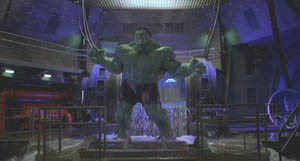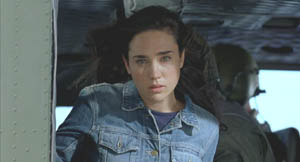|
"So, Mr. Lee, what do you think about doing this here Hulk movie?" "Yes...uhhm...does it have to be particularly about the Hulk, as such?" I can't help but imagine some sort of similar exchange taking place at some point during the evolution of this project. For those of you not in the know, the basic gist of the Hulk story is this: Doc Bruce Banner, pelted by gamma rays, turned into the Hulk. Pretty simple. Pretty not-very-rich-and-meaty. And I think that director Ang Lee likely felt much the same way, leading to a lot of excursions into all the possible ways he could make the film such that it would be able to sustain his interest long enough for it to actually get made, hit theaters, and fail to do very well. He probably didn't plan that last part, but one could probably see it coming. 
For the record, in Hulk, Doc Bruce Banner is still pelted by gamma rays, but this is only one little piece of the puzzle that ultimately leads to his transformation into a big green guy who breaks things. As we know a bit more about radiation than we once did, the origin story gets fleshed out, or at least deliberately obfuscated, with lots of other dodgy science, in order to make the idea remotely believeable to a modern audience, much like Spiderman. As we now all know that being bitten by a radioactive spider will at most turn you into the Amazing Cancer-Man, we must likewise acknowledge that a high dose of gamma rays would likely result in the Incredible...Cancer Man. Or possibly the Incredible Radiation Burn Man. But nothing good. In addition, we're also given a more fleshed-out back story for Bruce that goes back to his childhood days, where it is revealed that he was the progeny of a mad scientist who experimented on himself and passed on whatever he'd self-inflicted to his kid. Lee has radically reinvented the story as a whole, and while it's not at all a mystery as to why he'd want to break out of the constraints of the material, which are pretty significant, it's also not an entirely successful attempt. For starters, the Hulk is, as previously mentioned, a big angry guy who breaks shit. As characterization goes, it's pretty thin. Long before we get into any big "Hulk smash" bits, we get a story centered around Freudian conflicts and family drama. Bruce is suddenly forced to confront the reality of his true father's nature, after having believed his birth parents to be dead for the majority of his life. His ex, Betty Ross, played by the always eminently watchable Jennifer Connelly, is at odds with her own father, who, as a much younger man, shut down the work of Banner Senior and sent him to prison, and who now sees the grown-up Bruce as the return of a potential catastrophe not quite so resolved as hoped. With a superhero persona so lacking in much of a personality, making the human side of him would seem to be of paramount importance, yet Bruce never feels particularly developed. Much of his character conflict revolves around a half-recalled memory of his youth, but as we see most of the event in omniscient flashback right at the start of the film, there's ultimately little to finally reveal later on that isn't blatantly implied from the beginning. 
At the same time that the film is trying to be a serious character piece, it's also being very aggressively directed in terms of the visuals. After the title sequence has floated a few minutes into the past, one could begin wondering, now that the credits have all been presented in a nice, flashy way, if the film is perhaps going to calm down and start telling the story in a more relaxed manner, one which is not constantly pulling out split screens and overlaps and other crazy trick shots. In part, this almost seems to be attempting to emulate the visual style of the very same original medium, i.e. comic books, that the writing seems determined to leave well behind. At other points it seems just an attempt to constantly throw things at the viewer. Sometimes the over-styled images appear to have some relationship with the ideas being presented, but at other times they seem as though their presence is merely an attempt to continue the established style, sometimes wrenching the audience out of experiencing the moment in favor of the specific presentation of the moment. Images of Hulk-shapes flashing through the storm clouds in the final conflict, symbolically depicting the creature as a force of nature, for example, are artful and add a mythological feel. Conversely, Josh Lucas's final scene leaves me saying simply, "What the hell was that, beyond an attempt to get the audience to exclaim, as per sixteen words ago, 'what the hell was that?'" There's also something not quite satisfying about having some giant, Hulkified dogs as early obstacles. For one, it's rather campy, especially since one of them happens to be a poodle, and two, who wants to see the ostensible hero beat some dogs to death, even monstrous CGI dogs? I think I can see, in a way, what Ang Lee wanted to do here, but in the final analysis, or at least my final one, he just gives us the what and forgets to include the why. Why does Bruce Banner have difficulties with his temper? Why is his father such a power-mad prick? We don't ever really know. The film isn't really an analysis of primal rage, merely a depiction, and stops short of really working as either a character piece or a big comic-book romp. I can sympathize with his artsy aspirations, but he doesn't take them far enough to overcome what is, despite a multi-pronged stab at punching it up, a rather insubstantial story. -review by Matt Murray
|
|
||||||||